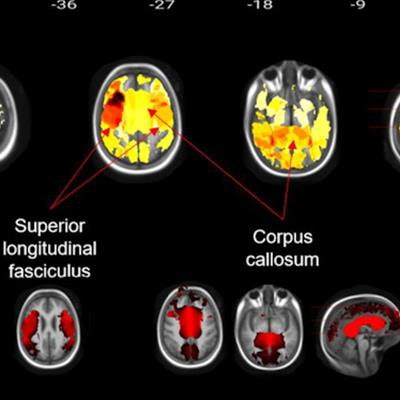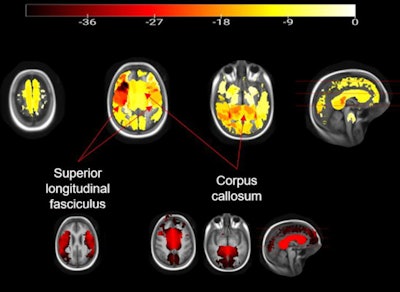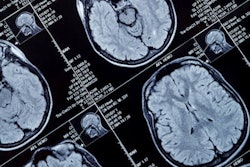
CHICAGO - MRI reveals links between obesity and poor brain health in children, according to a study presented November 28 at the RSNA meeting in Chicago.
Researchers led by Simone Kaltenhauser, PhD, from Yale University in New Haven, CT, found structural brain changes in overweight children, such as impairment to the integrity of the white matter. They also found associations between increased weight and decreased connectivity in the brain's functional networks associated with cognitive control, motivation, and reward-based decision-making.
"Our findings highlight the neurodevelopmental implications of preadolescents' obesity and overweight and point to the need for targeting brain health indicators early on during childhood," Kaltenhauser's group wrote in their abstract.
One in five American children is obese, according to the Centers for Disease Control and Prevention (CDC). The Kaltenhauser team wanted to explore if there is any relationship between the weight and body mass index (BMI) scores of preadolescents and brain MRI metrics.
To do so, the group used imaging data from the Adolescent Brain Cognitive Development (ABCD) study that included nearly 12,000 children aged 9 to 10 years from 21 centers across the country. They employed a region-of-interest approach to image white-matter tracts, using T1- and T2-weighted structural MRI, diffusion tensor imaging, resting-state functional MRI, and restriction spectrum imaging.
The study included data from 5,169 children. Overweight and obesity rates were 21% and 17.6%, respectively (calculated according to BMI scores).
 The integrity of the white matter is impaired with higher body mass index (BMI) scores in children, researchers found. The most affected areas include the corpus callosum, which is the main connector of both brain hemispheres, and the superior longitudinal fasciculus that connects several lobes. Images and caption courtesy of the RSNA.
The integrity of the white matter is impaired with higher body mass index (BMI) scores in children, researchers found. The most affected areas include the corpus callosum, which is the main connector of both brain hemispheres, and the superior longitudinal fasciculus that connects several lobes. Images and caption courtesy of the RSNA.Kaltenhauser and colleagues found that higher weight and BMI scores were linked to lower fractional anisotropy values, lower axial diffusivity values, and lower neurite density values, among other values with tracts within the brain's hemispheres that connect the lobes.
For both weight and BMI scores, fractional anisotropy reductions were most pronounced in the corpus callosum, fornix, and (parietal and temporal) superior longitudinal fasciculus regions of the brain. The corpus callosum is the primary connector between the brain's two hemispheres.
The investigators also found higher radial diffusivity as well as lower axial diffusivity values, which were significant for most regions of interest, including thinning of and higher surface area of cortical regions -- the area of the brain associated with impaired executive function -- and disruptions in inter- and intranetwork function.
The findings offer a more tangible picture of associations between higher BMI in children and poor cognitive functioning and school performance, the team concluded.



















